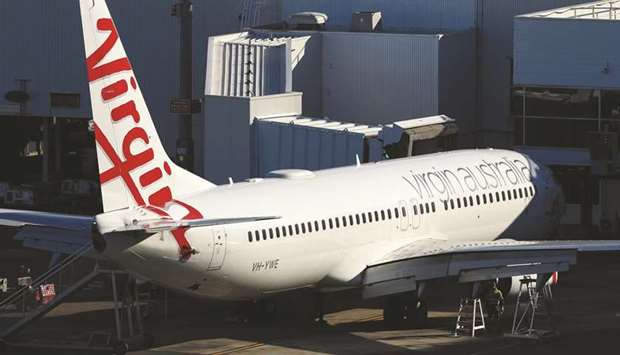Bain Capital LP agreed to buy collapsed airline Virgin Australia Holdings Ltd in one of the biggest single bets on the industry since it was shattered by the coronavirus pandemic.
Administrator Deloitte named Bain as the airline’s new owner yesterday, hours after rival buyout firm Cyrus Capital Partners LP withdrew its bid.
The value of the deal wasn’t disclosed, though Deloitte said there will be “a significant injection of capital” into the airline.
Virgin Australia’s shareholders, including some of the biggest names in aviation such as Singapore Airlines Ltd and Etihad Airways PJSC, were wiped out.
Bain’s investment is a brave bet on a sector enduring its biggest crisis ever, as well as on the Virgin Australia business itself, the country’s second-biggest airline.
Larger rival Qantas Airways Ltd this week depicted a bleak outlook, cutting 6,000 jobs, grounding about 100 planes and raising as much as A$1.9bn ($1.3bn) to survive a prolonged downturn.
While domestic travel is slowly recovering, Australia’s government has said the country’s borders could be kept largely closed until 2021.
Airlines worldwide are likely to lose $84bn and see their revenues halve this year, according to the International Air Transport Association, which expects 2020 to go down as the worst year financially in the history of aviation.
Virgin Australia collapsed in April under A$6.8bn in borrowings as the outbreak halted global travel.
Even before coronavirus-related restrictions nearly froze revenue, Virgin Australia had lost money for seven consecutive years.
The airline started as a low-cost domestic carrier in 2000, before destroying its balance sheet trying to compete with Qantas as a full-service operator with routes to the US and Asia.
When it went under, Virgin Australia employed about 10,000 staff and operated 144 aircraft, generating almost 80% of its revenue from domestic flights.
It had pushed back delivery of Boeing Co 737 MAX jets to July 2021, when it expected to receive the first of the 48 it had on order. Deloitte said yesterday it’s still not possible to determine how much of Virgin Australia’s debt can be recovered, though more details will come in a report to creditors that’s due before the end of August.
Shareholders, though, can expect nothing, Deloitte said.
Virgin Australia was almost entirely owned by four foreign aviation groups – Singapore Air, Etihad, HNA Group Co and Nanshan Group Co – that each owned 20% stakes. Richard Branson’s Virgin Group owned about 10%. Deloitte’s decision ends an auction process that initially drew interest from more than 20 parties.
Cyrus exited on Friday with a fiery attack on the sale process, accusing Deloitte of a “lack of engagement” since the US investment group submitted its takeover proposal on June 22.
In a separate statement, Bain said it will strengthen Virgin Australia’s regional services and continue serving business travellers.
Bain is backing managing director Paul Scurrah, who had already started to cut costs and simplify the airline when the virus struck.
The carrier’s headquarters will stay in Queensland, the state government said.
Bain’s deal may face a further challenge from Virgin Australia’s bondholders, who this week submitted their own plan to swap their debt for new shares under an independent board.
And the sale agreement with Bain still needs to be approved by creditors.
“Bain put forward a solid bid,” said Michael Kaine, national secretary of the Sydney-based Transport Workers Union. “We are happy to work with them on the plan for getting the airline back on its feet.” Virgin’s more-than 10,000 creditors include about 9,020 employees, court filings show.
In April, Prime Minister Scott Morrison’s government refused to give the airline even A$200mn to survive, tipping Virgin Australia in alongside UK carrier FlyBe as one of the world’s highest-profile corporate casualties from coronavirus.

An aircraft operated by Virgin Australia Holdings stands at a gate at Sydney Airport. Bain Capital agreed to buy collapsed airline Virgin Australia in one of the biggest single bets on the industry since it was shattered by the coronavirus pandemic.
